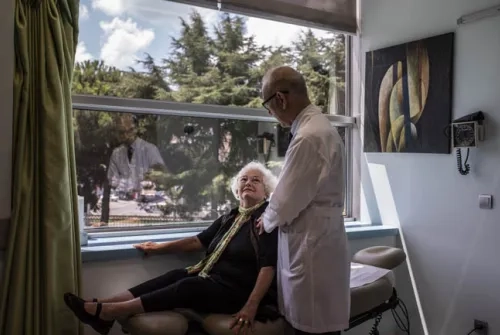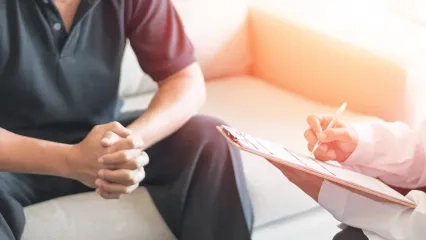Alo Yeditepe
Alo Yeditepe
Her Kidney Stone, 6 cm in Size, Was Taken With One And a Half Hour Operation
67 year old Mürvet Gülbay from İstanbul got rid of pains she had been suffering for 5 years through a non-surgical and pain-free operation lasting one-and-a-half hours. Stating the fact that the surgery, which was done by means of a flexible method through which the stones in the kidney are broken, a first in the world for such a big stone, the Urology specialist Prof. Dr. Faruk Yencilek said: “Our aim was to turn this huge stone into dust and we managed it.”
The Flexible system, enabling the stones in the kidney to be broken into pieces, has been applied in Turkey for about 15 years. During the non-surgical operation without damaging the integrity of the body, the kidney is reached through following the route of the urinary tract backwards. The Medical Director and the Urology Specialist Prof. Dr. Faruk Yencilek of the Yeditepe Hospitals, who stated that he has used the Flexible system since 2003, said that they had broken such a big-sized stone by means of the Flexible system for the first time in Turkey and in the world.
“There is No Such Size in The Literature”
Underlying the fact that thousands of patients have been treated with this method without pains for many years, Prof. Dr. Faruk Yencilek added: “Our experience with this method has been enriched over years. Thanks to this method which we applied for small-sized stones at the beginning, we have now reached a 6 cm sized stone in the last surgery. According to the literature review I have done, there is no “nephrotomy operation with the flexible system” on a 6 cm sized stone up to now.
Mürvet’s operation is a first. Our main goal was to turn this huge stone into dust and we have achieved that. We placed a stand into the kidney to remove the tiny dust pieces afterwards. After a month, the system will be totally cleaned and we will take this stand out and the process will be completed.”
Renal Calculus is The Reason For Renal Impairment!
Emphasizing the fact that Turkey is located in the warm zone called ‘calculus zone’, Prof. Dr. Yencilek said: “In our country, 14 per cent of the population has renal calculus. One of the most common reasons for chronic renal impairment in Turkey is caused by renal calculus. Therefore, these must be treated. If renal calculus is not treated, they grow and damage the kidney. Besides that, you should not forget about the fact that stones can be formed again if they are not treated and followed up adequately. Clearing out these stones is very important in this respect. Just like when we were children and naturally in the risk group for childhood diseases, when we are over 40 years old, we start to become a risk group for urological problems; even when we do not had any problems before. Although renal calculus can be seen at any age group, people over 40 years should see a doctor for a urological examination. People with renal calculus or obesity in the family history should be careful, consume a lot of water and do exercises instead of an inactive life style.”
“I Cannot Look at Stones Anymore”
Mürvet Gülbay, who had been suffering from kidney pains for 5 years, stated that she always postponed the treatment by taking pain killers. After she saw blood in her urine, she rushed to the hospital and Gülbay told us the rest of her story:
“First they detect an infection through the applied tests, then a 6 cm sized stone was seen in my kidney. Some nights I had severe pains and I could hardly sleep. During and after the operation, I did not have any pains. I checked out of the hospital after one night. I am feeling so good that I still cannot believe it. I am removing sand out of my body now but there is no pain. I am getting rid of the stone pieces through my urine. I drink a lot of water. I cannot put my happiness into words.
I regret not going to a doctor until this time. I am telling everybody that: “you should go to a doctor and have your kidney examined”. I cannot look at the stones anymore but I am so good, Thank God. I also cannot believe in myself”.
Her son Tarkan Gülbay, who stated that his mother could not sleep for a long time because of pains, said: “Her pains were so irritating for my mother. She could not sleep at all during the nights. We tried our best to help her. When there was blood in her urine, we went to the hospital immediately. We are so glad that she has recovered comfortably from this problem.”
About
Faculty and Year of Graduation:
Marmara University Faculty of Medicine, 1996
”
See Also
- What is Prostate Cancer? Symptoms and Treatment
- What is Benign Prostatic Hyperplasia, How is it Treated?
- Chronic Pelvic Pain
- Does Prostate Enlargement Develop into Cancer?
- One in Every Four Men Diagnosed with Cancer Has Prostate Cancer
- Ways to Protect Prostate Health
- Surgical Treatment of Prostate Diseases
- Ways to Get Rid of Kidney Stones
- Prostate Preventive Cancer Treatment: Focal HIFU
- HIFU Focal Treatment for Prostate Cancer
- The Things You Should Know About Prostate Cancer
- HoLEP Method in Closed Prostate Surgery
- Benign Prostate Enlargement
- Who Can Undergo HoLEP Procedure?
- Gold Standard Treatment for Benign Prostate Enlargement: HoLEP
Alo Yeditepe




